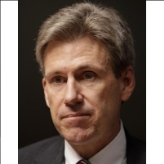Officials
Back to Officials


Offical

Name: Stevens, Chris
Current Position: Previous Ambassador
The North African nation of Libya, whose successful revolution against long-time dictator Muammar Gadhafi is currently threatened by militia violence and regional separatism, had a new US ambassador with extensive personal experience in Libya. John Christopher Stevens, a career member of the Senior Foreign Service who has served two tours of duty in Libya, was nominated by President Obama on January 23. He was confirmed by the Senate on March 29, 2012. He was killed in Benghazi on September 11, 2012, the first U.S. ambassador to be murdered while on duty sicne 1979.
Born in April 1960 and raised in northern California, Stevens earned his undergraduate degree at the University of California at Berkeley in 1982, a JD from the University of California’s Hastings College of Law in 1989, and an M.S. in National Security Studies from the National War College in 2010. He was also a Peace Corps Volunteer, teaching English in Morocco from 1983 to 1985.
Prior to joining the Foreign Service in 1991, Stevens practiced international trade law in Washington, DC, for several years. At the State Department, Stevens’ early career foreign postings focused on the Middle East, including service as consular and economic officer at the embassy in Riyadh, Saudi Arabia; consular and political officer in Cairo, Egypt; political officer in Damascus, Syria; and deputy principal officer and political section chief at the consulate in Jerusalem, Israel.
At the State Department in Washington, Stevens has served as a staff assistant in the Bureau of Near Eastern Affairs (1996), Iran desk officer, and special assistant to the under secretary for political affairs. From late 2006 to May 2007, Stevens was on detail as a Pearson Fellow to the Senate Foreign Relations Committee, where he served as minority staff advisor on Middle East affairs, reporting to Senator Richard Lugar (R-Indiana).
In June 2007, Stevens was posted for the first time to Libya, serving as deputy chief of mission and later as chargé d’affaires at the embassy in Tripoli until 2009, when he was named director of the Office of Multilateral Nuclear and Security Affairs. In August 2008, in a diplomatic cable leaked by WikiLeaks in 2011, Stevens attempted to prepare Secretary of State Condoleezza Rice for her upcoming visit with Gadhafi, describing him as a “notoriously mercurial” man who “often avoids making eye contact during the initial portion of meetings, and there may be long, uncomfortable periods of silence. Alternatively, he can be an engaging and charming interlocutor.” It was during this visit that Gadhafi revealed his romantic crush on Rice, which she has since described as “weird and a bit creepy.” Indeed, Stevens had warned Rice, “A self-styled intellectual and philosopher, he has been eagerly anticipating for several years the opportunity to share with you his views on global affairs.”
For his second tour in Libya, Stevens was sent to rebel headquarters in Benghazi, Libya, to serve as special representative to the Libyan Transitional National Council. He arrived on a Greek cargo ship on April 5, 2011 and stayed until November. His mission was to forge stronger links with the Interim Transitional National Council, and gain a better understanding of the various factions fighting the Gadhafi regime. His reports back to Washington were said to have encouraged the U.S. to support the rebel council, which the Obama administration did formally in July 2011.
Stevens speaks Arabic and French.
Clinton Sends Envoy Stevens to Size Up Libyan Opposition (by Nicole Gaouette, Bloomberg)
- Latest News
- D.C. Public Schools will Teach all Second-Graders to Ride a Bike
- New Rule in Germany Limits Sales of Sex-Themed E-Books to 10pm to 6am
- What Happened to the 6-Year-Old Tibetan Boy the Chinese Government Kidnapped 20 Years Ago?
- U.S. Ambassador to Turkey Photoshops his Hair Color to Mock Turkish Mayor
- Mystery Artist Calls Attention to Unfixed Potholes by Drawing Penises around Them




